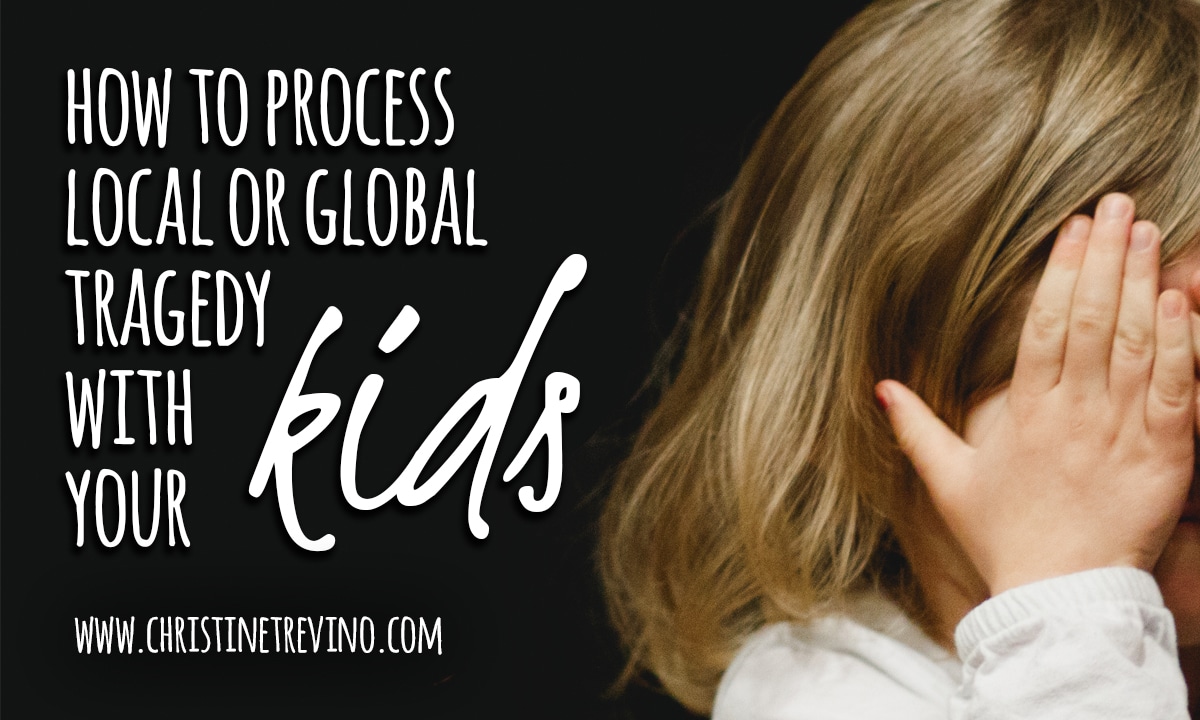How to Process Local or Global Tragedy with Your Kids

What is most alarming is how this environment affects the hearts and lives of our watching children.
As parents, our responsibility and our challenge, is to walk with our children through moments of tragedy toward the promise of hope. While the issues in our world are difficult and complex, an honest, age-appropriate, faith-based conversation doesn’t have to be.
Here are a few key points to consider as you help your child process local and global tragedy.
Find out what your child knows.
Depending on the age and temperament of your child, it is absolutely appropriate to shield them from what you can. When that approach is not an option, keep discussion brief. Stick to the facts and only what your child needs to know about those facts. Answer questions honestly, but don’t create anxiety where there is none by adding information they haven’t asked for.
- What does your child already know about the situation? How does it make them feel?
- What concerns or fears do they have?
- What information are they old enough and mature enough to handle?
Give your child freedom to wrestle with their faith.
When faced with crisis, believers and seekers alike struggle to make sense of faith. It should come as no surprise that your child may ask why God allowed this situation to happen. Remind them that God is big enough to handle their questions, that it’s ok to talk with you about them, and that you are committed to helping them find faith on the other side of their struggle.
- What question(s) is your child asking about God? How does that impact their faith?
- What areas of faith do you need to wrestle through?
- Where, and to whom, can you go for Godly counsel?
Assure your child there is still hope.
Crisis and tragedy often cause us to wonder if something similar will happen to us, to our home, to our city. While we can’t promise our kids that bad things won’t happen, we can assure them that God will always be with us through them. Remind your child of the promises we have in God’s Word. Commit specific scripture to memory. Pray with your child for God’s peace on earth, and His peace in their heart.
- What Bible stories, characters, or passages of scripture come to mind as a point of inspiration and hope?
- How do you rely on God in times of crisis? In what ways can you communicate that to your child?
Help your child recognize the light around them.
As often as it is appropriate, redirect your child’s attention to where God is working through crisis. Train your child to look for the helpers and intentionally share stories of people and organizations that are making a difference. Try to make a personal connection with someone your child knows – a teacher, police officer, solider, rescue worker, or local government leader – that can echo words of hope and life.
- Who is making a difference?
- How are they bringing help and hope to hurting people?
- Where can we see the light of Christ today?
Teach your child to be the light.
In big ways and small ways your child can make a difference in the world by sharing the light of Christ with others. As a family, brainstorm ways in which you can practically and tangibly be that light. Consider raising money for those directly affected by crisis. Deliver a treat with a heartfelt note to local civil servants. Sponsor a child in a crisis area through global relief organizations. The opportunities and possibilities are endless.
- Who is living in a dark place right now?
- How can we be light in the darkness by offering comfort and hope to others today?
Know when it’s time to ask for help.
If your child is especially sensitive to the needs of others, or a crisis has tragically intersected your everyday life, you may need to seek professional help. Licensed counselors and pastors can be the light of Christ in a very practical way to your family, helping your child process what they’ve experienced, and leading them to a place of healing and hope.